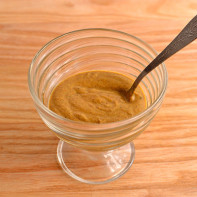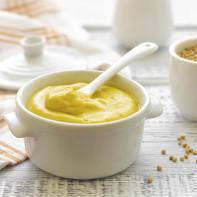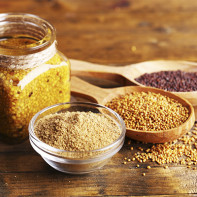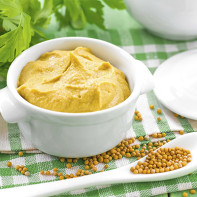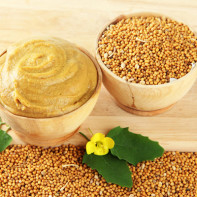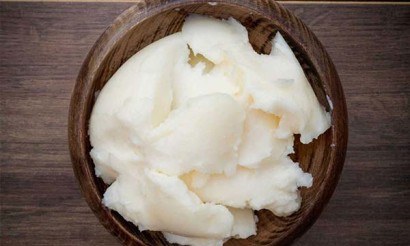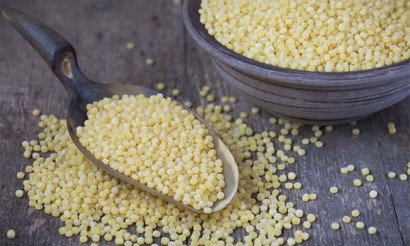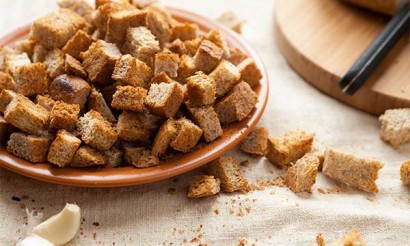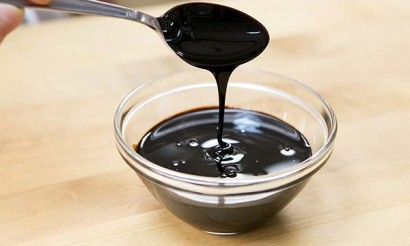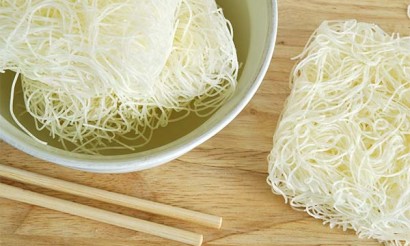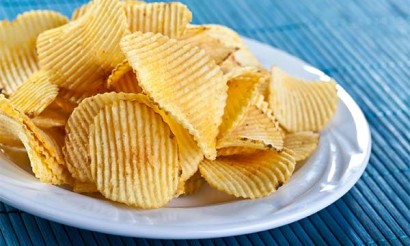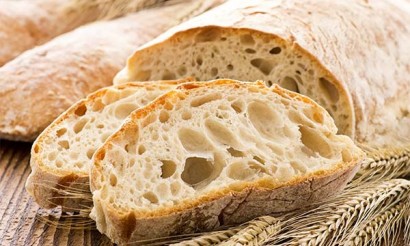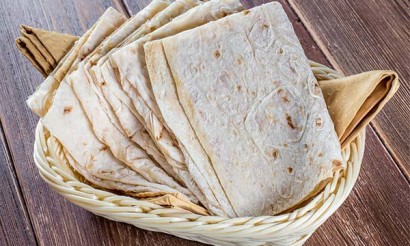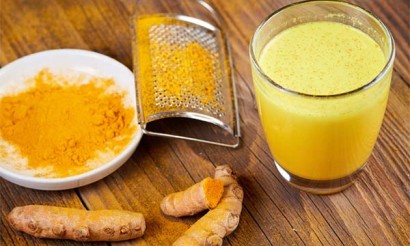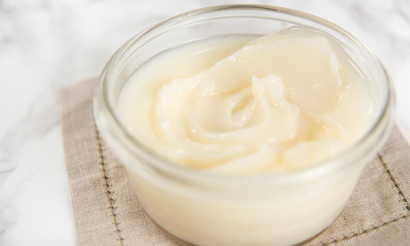Mustard: calories, useful properties and contraindications
Mustard warms, strengthens health, improves the taste of food and performs many other "functions". It is worth to study its features in detail, in order to use it with maximum benefit.
- What is mustard and what is it made of
- Types
- What is the difference between Dijon mustard and regular mustard
- Composition and Calories
- What is mustard good for?
- For Women
- For Men
- Pregnancy
- Breastfeeding
- For Children
- For weight loss
- The benefits of mustard powder
- French mustard: benefits and harms
- Mustard oil: useful properties and contraindications
- How Mustard Seeds Helpful
- Mustard in medicine
- For Diabetes
- In pancreatitis
- For gastritis
- When constipation
- For gout
- For the liver
- For hemorrhoids
- Pri cholecystitis
- Recipes of folk medicine based on mustard
- Mustard in cosmetology
- Mustard Hair Masks
- Face Masks
- Where Mustard is Used
- Cookery
- At Home
- For the garden
- Harm and contraindications
- How to properly store mustard
- How to make mustard at home
- From mustard powder
- With cucumber brine
- Interesting facts about mustard
What is mustard and what is it made of
Mustard is an annual plant up to 50 cm in height. The spice is made from its seeds. Whole, mashed or crushed grains are combined with liquid to make a paste. The product is seasoned with sour juice (citrus, apple), salt, wine and other flavors. The color of the seasoning is yellow with different shades. The taste of the finished paste can be sweet, richly spicy or spicy.
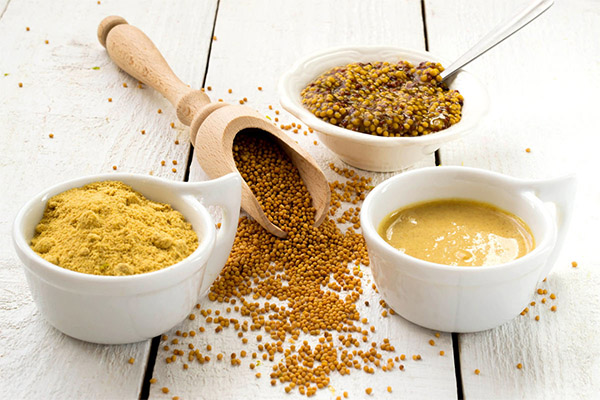
Several varieties of mustard are used to make the seasoning: white, black or sarepta mustard.
Black mustard is popular in southern Europe. The seeds of this species are small, dark in color, and sharp. They are used for Dijon sauce. Mustard is of high quality, quite expensive, because many of the valuable seeds fall out of the pods before they can be harvested. Often mustard is used instead of black mustard in such mixes.
Sarepta mustard (also called Russian mustard, or blue mustard) is a massive brown seed. Its taste, aroma and other culinary qualities are similar to those of black mustard. Sarepta can be purchased in the form of yellow flour or paste. It is used to make a traditional sauce, which is most often added to European dishes. It is produced in Asia, the Volga region.
White mustard (also called English mustard) is made from large, light grains. It is the least spicy of the species, with a faint odor and tangy flavor. It is often used in marinades (especially in the U.S.). It is most common in Canada.
Types
There are many types of prepared seasoning:
- Dijon - made from black grains. Modern seasoning combines black and brown seeds.
- Don - it is seasoned with brine.
- French - for it mix white and sareptic species (whole grains), add sugar, tarragon, vinegar and grape must.
- Bavarian - is a mass of roughly ground grains of white mustard, pepper, caramel syrup, juniper and ginger.
- English - a combination of stinging and mild powder, coarsely chopped seeds, cider or apple juice.
- American - it is mixed with white grains, turmeric, vinegar, and sugar.
- Chinese - mustard powder diluted with plain water.
- Fruity Italian - mustard powder flavored with wine, spices, and pieces of fruit.
- Creole - pickled blue grains with horseradish.
- German - sweet and sour sauce made of black grains and vinegar.
These are the most popular varieties on the world market. There are other recipes with original additives.
How Dijon mustard differs from regular mustard
The highlight of Dijon mustard lies in its composition and taste. The seasoning is made from huskless black and brown seeds and green grape juice. This sauce is mild, refined, with a rich variety of flavors and delicate texture. There is no excessive bitterness or acidity. A light aroma of spicy herbs complements the flavor bouquet. Dijon mustard is produced all over the planet, and the French have created about 20 varieties of it.
Russian mustard, called "table mustard," is made from the sareptic species, milled into a uniform flour. The traditional additives are vinegar and lean oil. Russian seasoning is more pungent than Dijon seasoning, and it rarely has any flavor-alleviating fillers added to it.
Composition and calories
Normal Russian mustard has a high energy value: 180 kcal per 100 g of product. Fats, carbohydrates in it - 11 g, proteins - almost 9 g. In its composition there are such chemical substances:
- sodium;
- phosphorus;
- iron;
- copper;
- zinc;
- magnesium;
- vitamins B, PP, A, C;
- beta-carotene.
Russian mustard is the basis for most sauces, united by the name "mustard.
How Mustard is Useful
The product is useful for most people, but you should not consume too much of it.
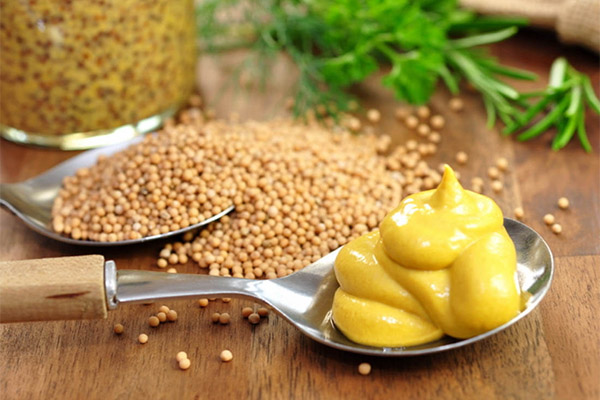
For women
The spice is useful for the female sex during menopause. Magnesium, calcium in the composition of the grains does not allow the occurrence of diseases that can accompany menopause (dysmenorrhea, osteoporosis). Hormonal disorders, acute pain during this period are well "smoothed out" with the help of magnesium.
For Men
The grains of the spice plant have antioxidants used for cancer prevention. Moderate consumption of spice stimulates "manhood". Modern men often suffer from heart disease, but vitamins K, C, A help protect this important organ.
When pregnant.
At this time, it is worth to add mustard to dishes little by little, if the body responds well to it. The hot sauce has a lot of copper, iron, which are useful for increasing immunity and fighting infections.
The seeds of the aromatic plant contain sulfur, an antifungal substance invaluable for skin problems. Folate, riboflavin establish the metabolism. When constipation is important to consume fiber: there is also enough of it in mustard seeds.
When breastfeeding.
During this period, the consumption of burning spice should be limited. Food fillers and acids can have a destructive effect on the intestines of the baby, which will assimilate dangerous substances with milk. Spices often used in the production of mustard can lead to allergies in the baby.
For children.
Children are allowed spice only from the age of 3 years after a medical examination and the approval of the doctor. The baby's body will more easily cope with a mild, non-acidic, not too burning variety of mustard. It is extremely important to analyze the list of ingredients on the label, so as not to feed the child "chemistry". Among the useful properties of the spice stand out the increase in appetite, a slight laxative effect, activation of metabolic processes, antifungal effect.
When losing weight
All those who lose weight should sometimes season their food with mustard, because this spice:
- activates the function of the gastrointestinal tract;
- A positive effect on the intestinal microflora, cleans it;
- strengthens sleep (which is important for normalization of nutrition).
It is useful not only to eat the hot sauce, but also to use it for spa treatments. Mustard wraps are an effective method of eliminating cellulite. The warming procedure stimulates blood circulation, due to which there is a burning of subcutaneous fat.
Mustard wrap recipe: grind mustard, honey, get a mush (take equal portions of raw materials); cover the problem areas of the body with the mass and wrap it in foil. Leave the product on the skin for 20 minutes. In pregnancy, cancer, heart disease, such warming wraps are inadmissible.
The benefits of mustard powder
Mustard is one of the known sources of useful substances. On the body, the spice has the following effects:
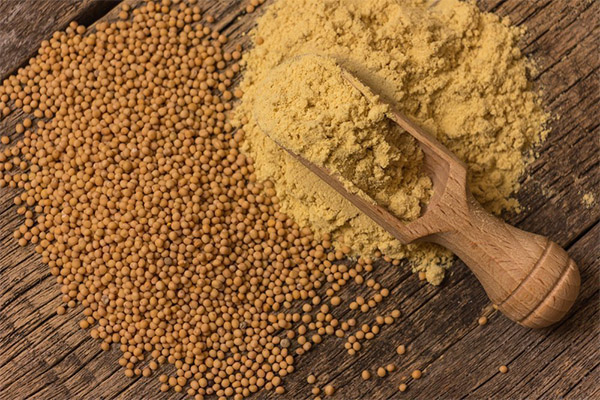
- Vitamins B, E accelerate the breakdown of complex substances (proteins, carbohydrates), stimulate their assimilation.
- Calcium improves salt metabolism, strengthens bones.
- Organic acids are aides in the formation of tissues.
- Potassium takes care of the heart muscle.
- Iodine corrects hormonal disorders.
- Iron promotes efficient blood formation.
The whole list of these substances keeps the condition of the body at an acceptable level, strengthening key organs, systems, immunity. Another positive feature of the golden spice is that it is considered a good organic antiseptic that destroys bacteria. But in severe situations, it is impossible to do without medication.
French mustard: benefits and harms
The French variety of mustard has been popular in the world for hundreds of years. It is combined with meat food, it promotes the active absorption of useful substances. It is also used as a component of marinades, breading for meat, as a flavor enhancer. French mustard is a well-known preservative that blocks the development of bacteria.
The spice contains dietary fiber, sugar, fats and proteins. The spice is also rich in vitamin B, so its use lifts the mood, activates the brain, and adjusts the failure of the nervous system. The antibacterial and anti-inflammatory properties of the spice are used to improve bowel function. But anyone who suffers from colitis and other serious diseases of this organ, it is undesirable to use a burning spice. French mustard are whole seeds, which retain the healing essential oil. They are effective for colds.
If you consume mustard from whole grains too often, gastrointestinal diseases can go into an acute phase. It should not be eaten before a night's rest, as it is known to have a stimulating effect. Essential oils from whole grains sometimes provoke allergies. Children should also be limited to milder types of seasoning (but only from the age of 3 years).
Mustard oil: useful properties and contraindications
The useful characteristics of mustard oil are known only since the last century. The product is obtained from mustard grains of the Cabbage family. It is a pleasant golden liquid with a fresh taste, which was first mentioned in ancient Greek texts. In India, this product was used to kill leprosy. In Russia it has been used for 200 years. It is interesting that the cooks of the nobility cooked with this very oil.
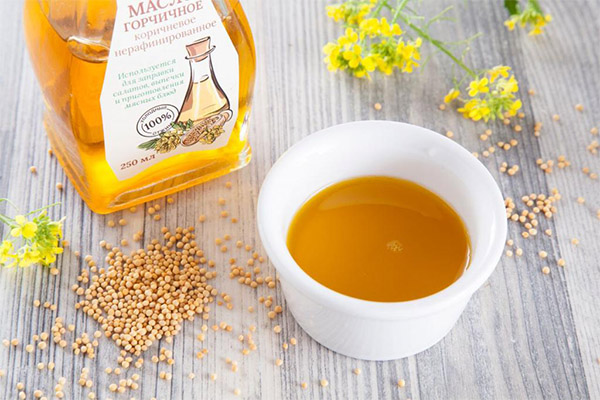
Modern folk remedies with mustard oil are used to prevent heart disease. The Ministry of Health recommends this vegetable oil, pointing out the high concentration of polyunsaturated acids in it. Cosmetologists use the product to increase the effectiveness of wraps and massages.
Components of mustard oil:
- essential oil;
- fat-soluble vitamins;
- ascorbic acid;
- calcium;
- iron;
- sinigrin;
- glycoside;
- myrosin;
- sulfur-carbon;
- fatty acids (linoleic, palmitic, behenic, lagnoceric, peanut, oleic, erucic).
Useful properties of spice oil:
- In vascular diseases, cardiac disorders and reducing blood viscosity.
- The product is an anti-atherosclerotic agent.
- Vitamin E is an effective antioxidant, thanks to which the body slows deterioration, the skin stays elastic, fresh longer.
- Vitamin K prevents the development of hemorrhoids.
- Vitamin D enhances the body's ability to fight pathogenic bacteria, supports a healthy ratio of calcium, phosphorus.
- Vitamin A helps take care of the eyes.
The substance is also used to accelerate wound healing, disinfection, pain relief. Thanks to the product, gastric juice is released more actively, which stimulates digestion. Externally, the substance is used for joint problems, in case of injuries. Internally, golden oil is used as an anthelmintic product. It is recommended to use oil in the diet of women during pregnancy, lactation, babies, and the elderly, because it is rich in biologically active substances.
Mustard oil treats those who suffer from seborrhea, acne, boils, herpes, herpes, dermatitis. Regular consumption of the product has a positive effect on blood circulation, which is why it is also purchased for hair care, for massages.
It is important to consider the harmful features of the oil. Its use worsens the condition of the weakened gastrointestinal tract. Both external and internal use of the oil can cause allergies.
What are the benefits of mustard seeds
In medicine, spice grains have been used for thousands of years to remove tumors and quickly "extinguish" acute pain. It was considered useful to start the day by consuming some mustard seeds. Many believed that this habit improved memory.
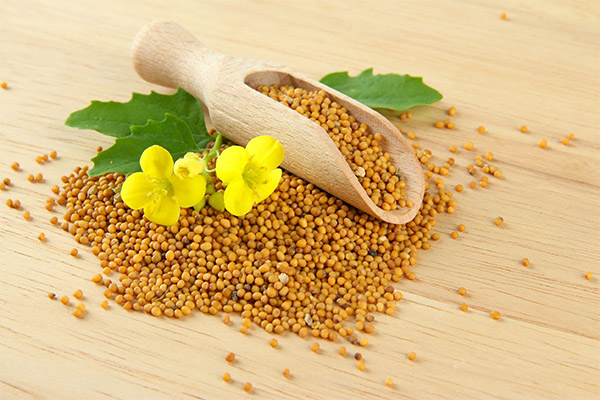
The product benefits the internal organs and has a positive effect on the appearance. Spicy grains are nutritious, quite caloric, unique in their properties. They are used as an antibacterial, antiseptic component of medicines. Spice in the form of seeds is consumed with poor appetite, problems with digestion and metabolism.
If a person is plagued by migraine attacks, hypertension, the reception of mustard seeds will help to reduce the manifestations of these diseases.
The high concentration of selenium and magnesium determined some of the healing properties of the product:
- anti-inflammatory effect;
- alleviation of asthma symptoms;
- Soothing the symptoms of rheumatic arthritis.
The therapeutic capabilities of mustard seeds are known in many areas of medicine. It is a powerful remedy that helps counteract hypertension, rheumatism, gall bladder disease, liver dysfunction, flatulence, sclerosis of the joints. Mustard seeds are a good aid in the fight against respiratory ailments. The substances in the whole seeds help to get rid of the runny nose.
Also preparations based on seeds are used for such pathologies:
- Stenocardia. Grind the grains, throw in 1 liter of hot liquid. Use as a healing bath, in which to immerse the hands for 5 minutes.
- Fever. Toss a pinch of mustard seeds grinded with salt into 30 ml of red dry water. Drink the liquid in a gulp. Repeat three times.
- Urolithiasis. Shake 0.4 liters of hot water with 10 g of mustard seed. Boil the liquid for 5 minutes, infuse a couple of hours. Take 3 servings a day (1 serving - 20 grams).
- Inflammation of the lungs. For one serving of 5 grams of grains grind in any way, whisked with 50 ml of warmed milk (you can replace water). Insist a mass for a whole night. Take the liquid on an empty stomach.
- Swelling. Combine 7 g of mustard seed and 50 g of flaxseed, introduce water (1 liter), boil everything for 10 minutes, insist the finished product for 1 hour. Take 5 servings a day (a portion of 60 ml.).
- Toothache. Take mashed grains, water (20 times more). Rinse the teeth (especially the inflamed area). Repeat three times a day.
Mustard seed is indispensable for cosmetic procedures. Means with ground mustard seeds warm the scalp, causing a rush of blood to the bulbs and stimulation of dormant roots.
By adding the powder to facial products, you can achieve a rejuvenated, soothed, moisturized skin.
It is important to consider that in cosmetic masses use dried mustard seed flour, not ready-made sauce or fresh seeds.
Examples of home care masks based on mashed mustard seeds:
- Care for Younger Skin. Chop 20 g of young parsley, combine with 10 g of crushed seeds and 10 g of thick sour cream. Spread the mass over all areas of the face for 15 minutes, rinse.
- Acne treatment. Heat 0.2 l of milk, combine with 40 g of crushed mustard. Distribute the product only on the areas with pimples, remove it with warm water.
- Take care of your hair. 40 g mustard flour, 40 ml of any herbal decoction, 20 grams of heavy cream and cognac combine in a container. Massage your scalp with the product, leave it to soak for 30 minutes and wash your head. If you feel discomfort, stop the procedure.
Mustard in medicine
Most often the spice is used if a person is concerned about gastrointestinal problems, inflammation of the joints.
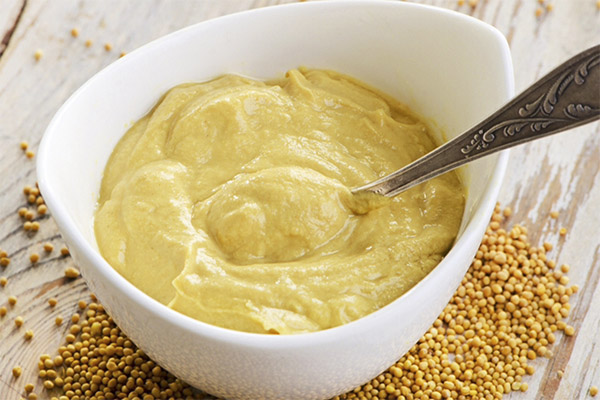
In case of diabetes.
Moderate consumption of the seeds of the spicy plant will benefit everyone who is faced with diabetes. There are few carbohydrates in mustard, and it is these that affect sugar levels. Medications created on the basis of mustard can awaken the appetite, relieve inflammation. The product can be used in different ways. For example, folk medicine advises to use 30 grams of seeds daily. The course should last 1 month. After that, it is worth taking a blood test so that the doctor will analyze the results of the course. Within a month, digestion should improve, and constipation should be a thing of the past.
You can also use the leaves of the medicinal plant: boil dried leaves, insist, strain. Eat 40 grams of cake (squeezed leaves) a day, the remaining liquid to drink in small portions after meals (1 portion - 10 ml).
With this disease, it is better to prepare the sauce at home, to avoid the use of preservatives, dyes.
Important: The glycemic index of mustard is 30 units.
In pancreatitis
In the development of this disease, all mustard products are prohibited, including natural whole seeds.
Gastritis
Popularly used folk method of treating the disease: you need to consume the seeds of the plant before eating. It is recommended to start the course with one pea, adding one more pea each time and bringing the single portion to 20 peas. After that, repeat everything, but vice versa - reducing each serving by 1 grain.
If you are constipated
In this case, you can use a mild mustard sauce in small portions, adding to the food, or use the grains before meals (a couple of pieces, the duration of the course - a month). Components of mustard will cleanse the intestines, improve the microflora of the organ.
In case of gout
Combine mustard flour, table salt (0.1 kg each), inject them with purified kerosene, whisk until the thickness of sour cream. Rub the paste into the affected areas. With food this hot sauce at gout do not use.
For the liver
The product is used to protect the organ from fatty deposits. White grains are especially good for the liver because they prevent the development of cancer. But the liver of an infant, the burning spice that he gets with milk, only harms, because the little body has difficulty processing and excretion of bitterness.
In hemorrhoids.
It is worth applying steam baths. Stir 80 g of mustard flour, 3 liters of "strong" boiling water, pour the mass into a bucket, then sit on top, wrapping the basin and the top of the bucket, so that the steam gets to the problem area. The procedure lasts up to 10 minutes. It is not necessary to endure the burning, in which case the bath is stopped earlier. It is important to repeat the procedure several times (no more than 1 time per day).
In cholecystitis
It is useful to introduce mustard oil in salads and other treats. An effective method of salvation from gallbladder dysfunction is to take a bath with mustard. To do this, you need to combine 0.2 kg of spice flour with 200 liters of hot water. It is better to mash the product first, adding a little water. It is recommended that the sensitive areas (buttocks, genitals, nipples) be smeared with petroleum jelly beforehand. Then it is necessary to immerse in a warm bath for 7 minutes. The procedure is performed every other day, the full course - 10 baths. It is important to remember some rules:
- Before the bath, the intestines and bladder should be emptied.
- It is useful to wash with soap and water, thus removing the fat layer.
- It is harmful to immerse in warm water with a full stomach.
- You should not drink alcohol, even in small quantities.
- The head, the heart area must necessarily remain above water.
- People who suffer from heart problems should dive so that the water reaches only to the navel.
- It is dangerous to increase the duration of the procedure.
- After the bath, you should rest for at least half an hour, wrapped in a soft cloth or sheet.
Active substances penetrate well through the steamed skin, improving the condition after the first bath.
Recipes of folk medicine based on mustard
The selection includes popular folk remedies, the component of which is mustard:
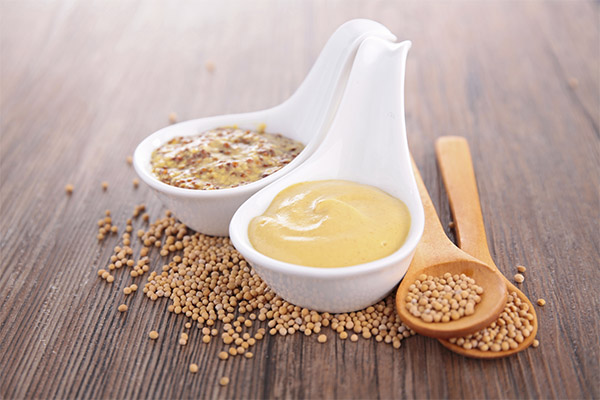
- Tincture of the seeds is prepared with 70% alcohol (150 ml). In it you need to throw freshly ground black seeds (10 g), then insist the preparation in a dark corner for 2 weeks. Use the liquid as a rubbing, useful for sciatica, myositis, gout.
- Compress should be made as follows: mustard and ordinary wheat flour dilute with heated water with 10 ml of vinegar. Distribute the paste on a piece of canvas and apply to the sore spot. When treating pleurisy, the canvas should be kept on the chest for up to 10 minutes. Rinse the skin at the end with warm water.
- In case of cold viruses, runny nose, feet should be warmed in a container of water in which 20 g of mustard flour and sea salt have been dissolved. After that, feet should stay warm (in socks, under a blanket). The procedure will harm people who are worried about varicose veins, high fever, heart disease, also it is impossible to do the procedure during menstruation. Pregnant women should not resort to such a procedure.
- Inflammation of the lungs will "recede" when mustard tablets are used. It is necessary to warm a couple of spoons of mustard seeds in a baking tray, grind them, add honey to obtain a sticky thick porridge. Take the mass in the form of small balls about 10 pieces a day.
- Sore throat can be removed with a solution. For it, 5 g of spice powder, 10 g of salt, 10 g of any honey, the juice of citrus dissolve in 0.1 L of heated water. Such a home remedy gargle your throat at least 6 times a day.
- For diabetes, white seeds (15 g) drink water (150 ml), which has been previously infused with a small amount of onion. Vegetable stand for 3 h. in cool water.
- With sciatica 0.1 kg of spice powder, 0.2 kg of salt, a little purified kerosene combine to make a porridge thick as sour cream. Rub the trouble spots with it.
- To get rid of a cough, dilute the mashed seeds with warm water, obtaining a mass of sour cream texture. With the preparation, smear gauze, put it on the chest area, which should be covered at the end with a piece of paper. Other products can also be used: horseradish or black radish pulp.
- With angina, you can stop an attack by holding your hands in mustard water. Warm water (1 l) combine with dry mashed mustard (20 g). Soak your hands in this mixture for 7 minutes. After treatment, rinse your hands with clean water and dry them with a towel. Apply cream to the skin.
- With unwanted pigmentation of the skin, combine 10 g of fine spice powder and a couple of drops of warm water into a mush. Apply it to the spots until it tingles, then rinse. Use the method every other day, but repeat it 7 times a day. For people with prominent vessels and wide pores, this procedure can be harmful.
- If the gastrointestinal tract malfunctions, a little mild mustard sauce can be introduced into the diet. It improves the metabolism, promotes easy digestion of heavy foods. 10 g of grains divided into several portions, take all parts in 1 day.
- With respiratory disorders, in the period of colds mustard flour (a couple of large spoons) to use for general baths and warming the feet. The procedures stimulate blood circulation, lead to deepening of breathing, separation of sputum. Duration of stay in mustard water - 10 minutes. The bath is useful only in the initial phase of the ailment.
- When an old cough useful mustard compress. Take equal portions of all ingredients: powdered mustard, honey, any lean oil, wheat flour, vodka. Warm the preparation in a water bath, put it on gauze and wrap it around your throat. Cover the top of the compress with a strip of cellophane (bag), fix it with a warm scarf. Repeat the procedure a couple of times.
- Potatoes and mustard help with coughs. Take a couple of boiled fruits in the peel, grind, inject 20 grams of powdered spice and lean oil. The mass gather into a flatbread, wrap it in a cloth, warm the chest. The top of the scone additionally cover with plastic wrap, a blanket and leave for the night.
This is just a small list of healing recipes. They can be supplemented independently if desired.
Mustard in cosmetology
There are many masks created to take care of the skin and hair.
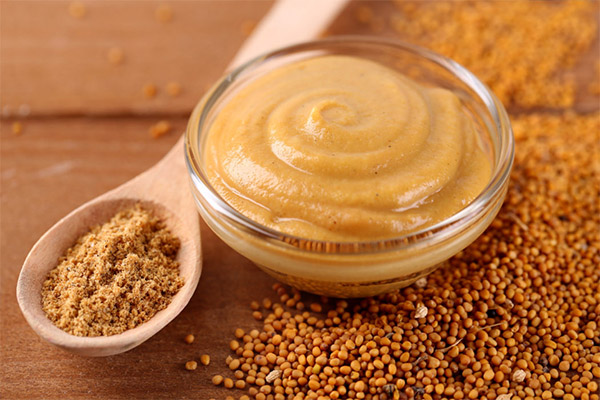
Masks for hair with mustard
Mustard flour is used by adding it to shampoos and kneading masks with it. Such means perfectly activate the blood vessels of the scalp. This has a positive effect on hair growth. You can make such popular care preparations:
- For hair loss. 40 g of aromatic powder, 30 g of sugar, 10 ml of burdock oil are mixed in a deep container, diluted with 30 ml of boiling water. Apply the mass to the roots of the hair, which is previously covered with olive oil, and hold the product for 60 minutes, not forgetting to warm the head with a thick towel or a soft warm cloth. Rinse the preparation with the application of shampoo on the roots and the entire hairline. It should be taken into account that the oil-based means to wash off with plain water will not work.
- For oily curls. The yolk of an egg is rubbed with 20 g of mustard flour, 40 g of tea brew. It is important to consider that blond girls for this preparation take green tea, and dark-haired - black. The ingredients are poured 50 ml of steep boiling water, insist them in a tightly closed container. The mixture is kept until the petals of the brew are fully opened. The mass can be squeezed, strain, apply to dry hair (especially the roots), do not wash off at least 20 minutes.
- For dry curls. 50 ml of boiling water is poured into a mixture of sugar, burdock oil, mustard flour (take equal amounts of these components), an egg yolk is added and the preparation is whipped. Wash off the preparation in half an hour after the treatment of the head.
On the basis of mustard to create a honey, mayonnaise, creamy masks. Also mustard can be combined with essential oils. It is important to remove the masks qualitatively, using a lot of shampoo and repeating the washing procedure a couple of times. Use masks up to 2 times in 7 days, because mustard can dry out the skin.
Face Masks
Some facial skin flaws can be treated with home masks based on ground mustard:
- Moisturizing. 40 ml of herbal infusion (you can choose from nettle, chamomile, mint or a mixture of these) is combined with 20 g of mustard flour, add a couple of drops of wheat oil and shake. This mixture is applied to the face (imperfections areas). Wash off after 30 minutes. Remove the mixture with warm water.
- For an oily sheen. Grind a small cucumber in a blender with 10 g of spice powder, egg white, 20 ml of strong infusion of mint / chamomile, 25 g of raw oats grits. The mass is distributed on the face with gentle massaging movements. After 10-15 minutes it should be washed under running water, then wipe the skin with a lotion suitable for oily skin.
- Cleansing of normal skin. Rub together 20 ml. of liquid honey, 10 ml. of lean oil (preferably wheat oil), egg yolk and incubate for 2 minutes in a warm water bath. Then pour 10 grams of mustard flour into the remedy and mix the mass. The paste is spread on the skin with a brush, making several thick layers.
Such spicy masks help to revitalize the skin, slightly whitening it. Apply preparations on mustard once every 3 days. For more effective whitening, you can introduce the juice of citrus, dill into the means.
Where to use mustard
The seasoning can be used in the household routine, for the vegetable garden, and in cooking.
In cooking.
In this sphere, mustard powder is used as a dressing for a variety of dishes. On its basis, they create a hot or mild seasoning, a variety of sauces, enter in natural form in the first, second dishes. The aromatic powder is most popular in the pickle season: it is poured into jars with preserves. As a rule, this component is added while pickling tomatoes and cucumbers.
Mustard powder is used for salting and smoking fish, sprinkle it on meat before grilling, add it to the marinade.
Mustard grains are the basis for various aromatic spices (e.g., curry). The product is added to any unsweetened dish. It is worth remembering that this is a strong spice, so the dosage should be minimal.
At home
Spice powder is often substituted for household chemicals:
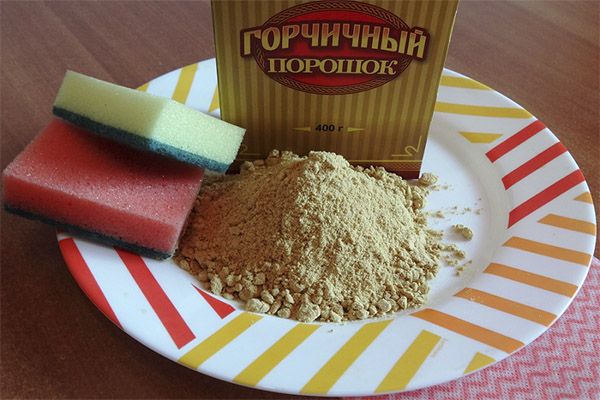
- Dishwashing. Mustard removes oily buildup and food residue even in cool water, killing bacteria in the process. For such a remedy mustard is turned into a mush by pouring a little water, cover dishes with the mass, let the plates stand for 15 minutes, wash them under running water.
- Removing odors. Kitchen utensils are rubbed with dry spice, washed with water (better under running water). If the first approach was unsuccessful - it is worth repeating the procedure.
- Eliminate the smell of furniture (in nightstands, cabinets). Ground spice is filled with cloth bags and placed where undesirable odors are felt.
- Washing. 0.1 kg of spice poured into a washing machine, include any desired mode (spice works as an ordinary purchase powder).
- Removing stains. Greasy marks on fabrics are removed with this ground spice. 0.2 kg of spice is shaken with 10 liters of clean water, kept in heat for 3 hours. Drain the liquid (do not use the sediment). Warm mustard water to 35 degrees. In it wash fabrics with greasy traces. Be sure to finish the wash, rinsing the laundry well.
These home remedies can be used regularly. It is important to check whether family members react negatively to the spice.
For the vegetable garden
Gardeners and vegetable gardeners also often use preparations based on mustard. It helps to exterminate pests: Colorado potato beetles, aphids, slugs, ants. Mustard products are considered an excellent fertilizer. You can use several recipes for the care of trees, vegetable crops:
- The easiest method of using mustard flour is to powder the ground around the plants with it, so the slugs will not destroy the crop. This procedure is effective before the plants take off.
- From caterpillars, aphids are used the following infusion: a bucket of water is shaken with 0.1 kg of mustard flour. 2 days the mass should insist at 25 degrees, then the liquid is shaken, add another bucket of water. Then the soap is introduced (40 g of dry product in 10 liters of mustard solution). After that, mustard infusion with soap is poured into a sprayer and distributed on the plants.
- A preparation based on mustard and soda is no less good at dealing with pests: soda and mustard are used in a 1:1 ratio. They are combined with 10 ml of liquid soap and 20 ml of vegetable oil, the mixture is shaken with 4.5 liters of water. Mature plants are treated with this preparation.
The listed home remedies have already proven their effectiveness, but it is worth applying them carefully, testing first on a small area.
Harm and contraindications
If the condition of the body is good, and diseases do not bother, then mustard will do no harm. But consuming it in unreasonable quantities can lead to unpleasant results. Eating too much of the product, a person does not disinfect the stomach, but provokes irritation, burns, indigestion. Contraindications to the use of spice:
- nephritis;
- gastritis, ulcers;
- inflammations of the gastrointestinal tract;
- pathologies of the large intestine.
It is not recommended to consume the spicy product for people suffering from allergies. Essential oils sometimes cause anaphylactic shock. More often, weaker, but unpleasant painful reactions of the body occur. It is important not to forget that if you are allergic to this type of oil, you need to get rid of all products with mustard in their composition. This can be pickles, mayonnaise, a variety of sauces, marinades.
How to properly store mustard
Condiment-paste is stored on the shelf of the refrigerator. It should not be sent to the freezer. Sauce, which was created without preservatives, can be left for 2 months at 0...+4 degrees. The temperature to +10 degrees reduces the shelf life to 40 days. Adding preservatives allows it to be stored for up to 90 days.
Powdered mustard is left in a dry place that is kept cool, where the sun's rays do not penetrate. It is important to pack the spice hermetically, because it "draws in" odors and moisture.
Leave the sealed container with the spice at home at 20 degrees and up to 70% humidity. The spice will not spoil in this case for about a year.
How to make mustard at home
At home you can prepare the most delicious spice from natural ingredients.
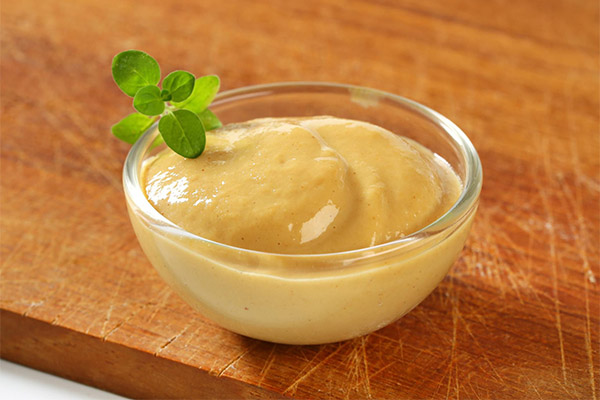
From mustard powder
The classic spicy version of the seasoning is prepared from the following products:
- powdered mustard - 110 g;
- hot water - 110 ml;
- powdered salt - 3 gr;
- sugar (in the form of fine sand) - 10 gr
- vinegar (preferably fruit organic) - 12 ml.
Preparation steps:
- Pour the spice powder into an airtight container.
- Pour a thin drop of hot water.
- Shake until homogeneous.
- Cover the product with a lid, kept in heat for 10 hours.
- The mass settles, and liquid appears over it. For a very spicy seasoning "water" is not drained.
- Salt, fruit vinegar and sugar are added to the paste.
- Leave the mixture in the fridge for a couple of hours.
Burning spicy paste is ready!
With cucumber brine
For home seasoning in brine use the following components:
- mustard (powder) - 110 g;
- brine (from under any pickles) - 160 ml;
- Lenten oil (not bitter) - 10 ml.
Preparation steps:
- Aromatic powder is poured with brine and stirred.
- Enter the oil.
- Insist in a room for 8 hours.
Spicy seasoning ready.
Interesting facts about mustard
There are many interesting facts about mustard:
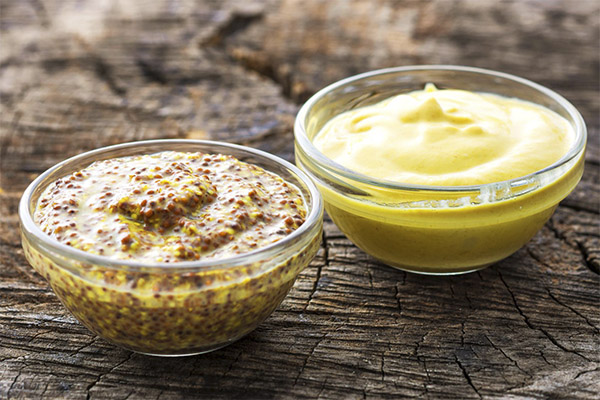
- This valuable aromatic plant belongs to the cabbage family.
- There's no consensus about the spice's origin: it could be ancient Afghanistan or eastern India.
- The Latin word, Sinapis, means "harm to the eyes", because tears can appear while rubbing the kernels.
- The first mentions of the spicy herb are found in the texts of the Bible.
- While studying the tombs of Egypt, scientists found aromatic grains (they were left there on purpose as a symbol of good luck).
- The largest center for growing the crop is India.
- In the U.S. (Wisconsin), a mustard museum was created, in which the first Saturday in August is the festival of this culture.
- In 2015, during the mustard festival in Volgograd, more than 160 kg of spicy paste were cooked in the street.
Mustard is a favorite condiment of millions of people, which has medicinal qualities. It is used in a variety of areas: medicine, cooking, cosmetology and households.
«Important: All information on this site is provided for informational purposes only. for informational purposes only. Please consult with a health care professional before using any recommendations. specialist before applying any of the recommendations. Neither the editors nor the authors shall be liable for any possible harm caused by materials."

